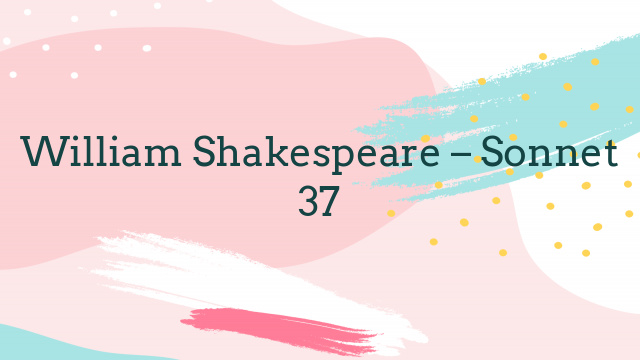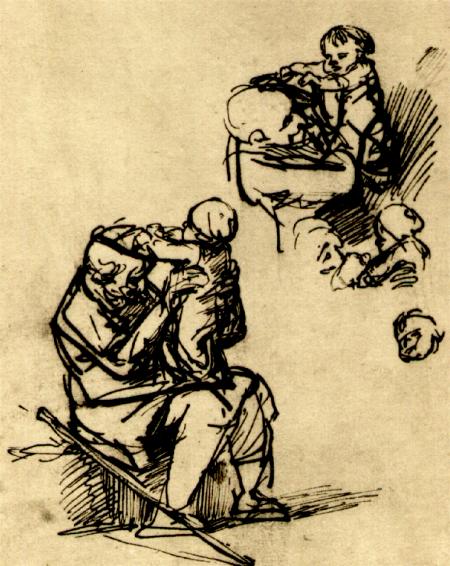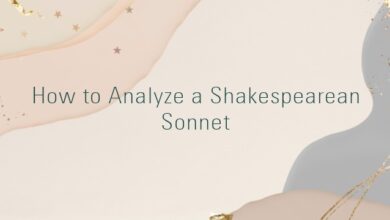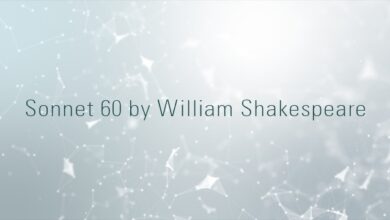
William Shakespeare – Sonnet 37
As a decrepit father takes delight
To see his active child do deeds of youth,
So I, made lame by Fortune’s dearest spite,
Take all my comfort of thy worth and truth;
For whether beauty, birth, or wealth, or wit,
Or any of these all, or all, or more,
Entitled in thy parts, do crowned sit,
I make my love engrafted to this store:
So then I am not lame, poor, nor despised,
Whilst that this shadow doth such substance give
That I in thy abundance am sufficed,
And by a part of all thy glory live.
Look what is best, that best I wish in thee:
This wish I have; then ten times happy me!
An interlude occurs, in which the poet takes stock and reflects on what the youth has given him. Though he himself is old and useless, the abundance of the youth’s qualities feeds into his veins, like sap into a grafted tree. This transforms him and removes his lameness and his failures. The youth has everything that is desirable, and the great store of his qualities diffuses its glory around. The poet is contented, for he sees that his beloved has all that is best, all that he could wish for him, and he basks in this reflected glory, his decrepit status now entirely forgotten.
The shadow/substance contrast of l.10 provides a possible source of dating of this sonnet, and in the further notes provided Sonnet 37 I have attempted to show how this might be done, and the difficulties involved therein.
The Sonnet is also important because of its links to biblical texts, in particular to Psalm 37. See the Introductory Notes for further discussion.
The 1609 Quarto Version
AS a decrepit father takes delight,
To ſee his actiue childe do deeds of youth,
So I , made lame by Fortunes deareſt ſpight
Take all my comfort of thy worth and truth.
For whether beauty,birth,or wealth,or wit,
Or any of theſe all,or all,or more
Intitled in their parts,do crowned ſit,
I make my loue ingrafted to this ſtore:
So then I am not lame,poore, nor diſpiſ’d,
Whilſt that this ſhadow doth ſuch ſubſtance giue,
That I in thy abundance am ſuffic’d,
And by a part of all thy glory liue:
Looke what is beſt,that beſt I wiſh in thee,
This wiſh I haue,then ten times happy me.
Commentary
1. As a decrepit father takes delight
a decrepit father = a father worn down with age. In Elizabethan times a man might consider himself old when he reached his thirties. Diet and the multitude of untreatable diseases all contributed to a rapid decline. Shakespeare was probably in his thirties when he wrote this. Indeed it may be that he was 37 and the sonnet is in some sense a ‘dating’ sonnet. See the Introductory Notes which discuss the links of this sonnet to Psalm 37. 2. To see his active child do deeds of youth,I.e. as a compensation for his own inability to be active.3. So I, made lame by Fortune’s dearest spite,
made lame – some commentators have suggested that this be taken literally, and that Shakespeare must have been lame. It is more likely that the lameness caused by Fortune is metaphoric. Cf. Speak of my lameness, and I straight will halt, 89, which suggests that normally he did not limp. dearest spite = most severe malignancy.4. Take all my comfort of thy worth and truth;
Take all my comfort of = derive all my comfort from.
worth and truth are qualities which link the beloved to Christ, particularly the words of St. John’s Gospel, And the same word became fleshe, and dwelt among vs ( and we sawe the glory of it, as the glory of the only begotten sonne of the father) full of grace and trueth. John 1. 14. Bishop’s Bible 1568. The echo is not exact, but the youth is often praised for his grace, as e.g. in Sonn 17
If I could write the beauty of your eyes
And in fresh numbers number all your graces,
See the Introductory Notes for further discussion.5. For whether beauty, birth, or wealth, or wit,
All these might be taken as the traditional inheritance of the aristocrat, whether real or imagined. In Shakespeare’s day, as in almost any age before the 20th century, there was a widespread belief that upper class people were naturally better in every respect and that genetic excellence was theirs by inheritance. Aristos is the Greek word for ‘best’, from which the word ‘aristocracy’ is formed, meaning ‘rule by the best’. These best (people) were of course by definition the upper classes. This belief is still alive today, but more subject to questioning by modern scientific investigation. 6. Or any of these all, or all, or more,The superabundance of all these qualities, and the way they seem to burst out of the boundaries of expressing them, as out of a magician’s hat, each one causing new wonderment, enhances the expectation of where it might lead. Are we to see a new monarch crowned, or a new era proclaimed? Surely they are enough to make the youth, or the beloved poet who sings his praises, immortal? Yet there is a slight suggestion that it is all empty nothingness, because the natural expectation of words at the end of this line leads one to anticipate Or any of these all, or all, or none, by analogy with the phrase ‘all or nothing’. So that the inherent hint remains that perhaps the youth is, after all, an empty shell.7. Entitled in thy parts, do crowned sit,Entitled in thy parts – the imagery is perhaps from heraldry, with the various qualities, beauty, birth, wealth, wit, personified and sitting crowned in the quarters of the shield. The general meaning is ‘whichever of these qualities is held by you, as of right (entitlement), in whichever part of you they reign, I latch on to them etc’. Entitled = having the right to a title, having the right to bear a coat of arms.8. I make my love engrafted to this store:I make my love engrafted to = I graft myself lovingly on to them. The Q spelling is ingrafted, possibly underlining the intimacy of the relationship. To this store = to the store and abundance of your good qualities.9. So then I am not lame, poor, nor despised,Referring back to l.3, but also to other sonnets, e.g. 29 When in disgrace with Fortune and men’s eyes…10. Whilst that this shadow doth such substance give


The imagery shifts from being engrafted, and bearing a title, to that of deriving sustenance from the beneficent shade offered by the youth. The meaning is approximately ‘While your shadow and your influence pours on to me such abundance of well-being, such absolute reality of existence’. The sudden appearance of substance and shadow in this sonnet is odd, and I suspect that it may be an oblique reference to the doctrine of transubstantiation, playing on the idea of the beloved as the Christ figure. There must be a link in thought also to 53
What is your substance, whereof are you made,
That millions of strange shadows on you tend?
See the Introductory Notes for further discussion of these points.
Shakespeare often used the substance/shadow dichotomy, which he seems to have been rather fond of. These are the instances of its use in the plays.
COUNTESS of A. Then have I substance too.
TALBOT No, no, I am but shadow of myself:
You are deceived, my substance is not here; 1H6-2-3
That Talbot is but shadow of himself?
These are his substance, sinews, arms and strength, 1H6-2-3
To your most gracious hands, that are the substance
Of that great shadow I did represent; 2H6-1-1
Which dreams indeed are ambition, for the very
substance of the ambitious is merely the shadow of a dream. Ham.II.2
…..Yet look how far
The substance of my praise doth wrong this shadow
In underprizing it, so far this shadow
Doth limp behind the substance. MV.III.2.126-9
That I have purchased at an infinite rate, and that hath taught me to say this:
‘Love like a shadow flies when substance love pursues;
Pursuing that that flies, and flying what pursues’. MW.II.2.206-9.
These references may be useful in dating this sonnet. See further notes Sonnet 37
The usual direction of traffic is from substance to shadow, in that the substance gives the shadow its being. Here I suspect there is a certain delight derived from suggesting that even the youth’s shadow has more power and substance than most people’s substance per se.11. That I in thy abundance am sufficed,
So that I have sufficient for myself from your abundant supply of excellence. Cf from Psalm 37
.. the meeke spirited shall possesse the earth: and shalbe delighted in the aboundaunce of peace. PS.37.11.12. And by a part of all thy glory live.A mere part of your glory is enough to give life and being to me.13. Look what is best, that best I wish in thee:Look what is best = whatever (in the world) is best. As in Sonn.9. Look what an unthrift in the world doth spend14. This wish I have; then ten times happy me!
This wish I have = My wish is granted. ten times happy me. The ten times is probably used to suggest a large number of times. It occurs here, in Sonn.6 and in Sonn.38 following this one. See however further notes on Sonnet 37
See also the Introductory Notes for further discussion of this sonnet and its probable links to Psalm 37.

Rembrandt. Two studies of an old man playing with a child. Circa 1635 – 40





